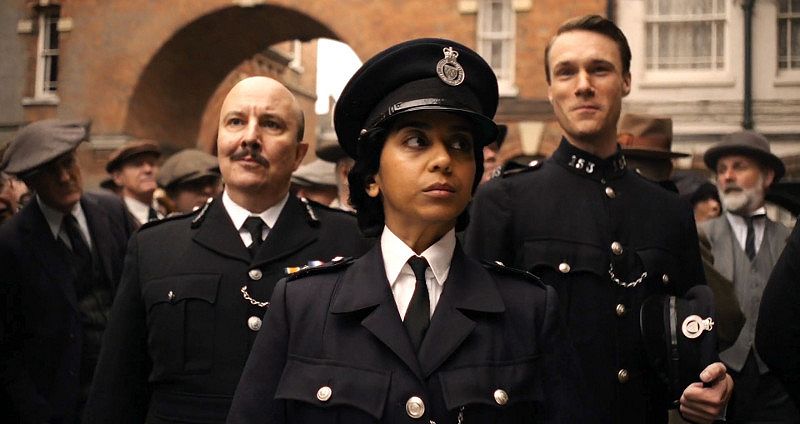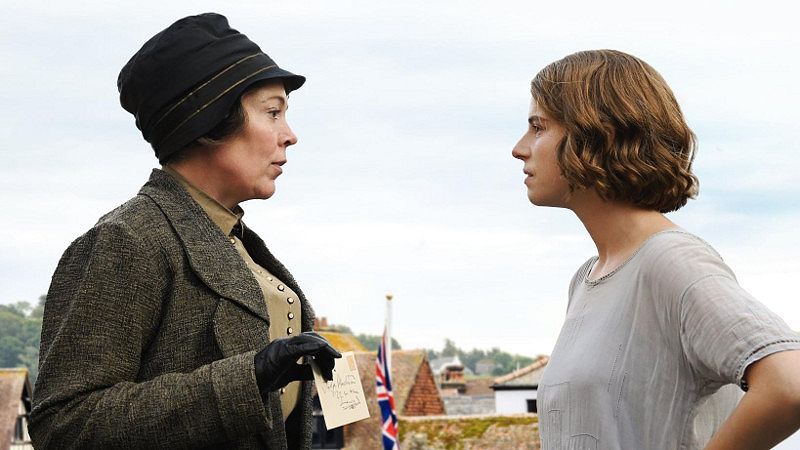Wicked Little Letters: A Comedy Mystery That Falls Short

A review of the comedy-mystery film, Wicked Little Letters, which falls short in its satirical elements and fails to stand out. Despite a talented cast led by Jessie Buckley and Olivia Colman, the movie lacks the sharpness needed to make a lasting impact. The story revolves around neighbors Edith Swan and Rose Gooding, whose friendship is shattered when Child Protective Services investigate Rose’s suitability as a mother. The film aims to satirize early 20th-century morality but becomes heavy-handed in its approach, detracting from the development of the story. However, the performances of Buckley and Colman captivate viewers, bringing humanity to their characters. Director Thea Sharrock presents the film as a tribute to female empowerment and freedom of expression, but it fails to strike the right balance of humor needed for the satirical elements to resonate. Overall, Wicked Little Letters showcases the talents of its lead actresses and explores intriguing themes, but its comedic and mystery elements fall short.
Wicked Little Letters: A Comedy Mystery That Falls Short
In the comedy-mystery film, Wicked Little Letters, the comedic elements hit the mark, but the satirical aspects often lack the sharpness needed to make a lasting impact. While the film boasts a talented cast, led by Jessie Buckley and Olivia Colman, their efforts can only do so much to elevate the material. Ultimately, the movie falls into the realm of middle-of-the-road art house films from the 1990s, lacking the punch it needs to truly stand out.

( Credit to: Reelviews )
Set in post-WWI rural England, the story revolves around neighbors Edith Swan (Olivia Colman), a middle-aged unmarried Christian woman living with her parents, and Rose Gooding (Jessie Buckley), a war widow with a young daughter and a penchant for profanity. Their unlikely friendship is shattered when Child Protective Services investigate Rose’s suitability as a mother, leading her to suspect Edith of reporting her. Soon after, Edith becomes the target of anonymous hate letters filled with vulgar insults, and her domineering father, Edward (Timothy Spall), demands action from the local police.
Heavy-Handed Satire and Overt Bias
While Wicked Little Letters aims to satirize early 20th-century morality, it often becomes heavy-handed in its approach. Characters like Constable Papperwick and Chief Constable Spedding are caricatures, lacking depth or nuance. The film also takes a clear stance, lionizing those with liberal ideals while portraying anyone with Christian beliefs as hypocrites. This overt bias detracts from the development of the story and gives away the mystery long before its explicit reveal.

( Credit to: Reelviews )
Captivating Performances by Buckley and Colman
However, the two central characters, Edith and Rose, manage to captivate viewers. Edith, a tragic figure molded by her overbearing father, has given up on her own dreams of marriage and motherhood. Rose, on the other hand, represents freedom from societal conventions, although she struggles to fully embrace it. The performances by Olivia Colman and Jessie Buckley bring a humanity to their characters that surpasses the limitations of the screenplay. Buckley, in particular, shines with her bold and unapologetic portrayal of Rose, injecting a breath of fresh air into the conservative town.
Underdeveloped Supporting Characters
Unfortunately, the third main character, Police Officer Gladys Moss (played by Anjana Vasan), falls flat as a one-dimensional character. While her motivations and backstory are briefly touched upon, she remains overshadowed by her male colleagues, serving as little more than a subordinate.
A Missed Opportunity for Satirical Resonance
Director Thea Sharrock presents Wicked Little Letters as a tribute to female empowerment and freedom of expression in an era marked by chauvinism and misogyny. The film also highlights the timeless and universal nature of anonymous hatred, drawing parallels between the hate letters of the past and the modern-day social media landscape. However, the movie fails to strike the right balance of humor needed for the satirical elements to truly resonate.
Conclusion
Overall, Wicked Little Letters showcases the talents of its lead actresses and explores intriguing themes, but its comedic and mystery elements fall short. While it attempts to critique societal norms and champion progressive viewpoints, the heavy-handed approach detracts from the story’s development. Ultimately, the film falls into the realm of a middle-of-the-road art house offering, lacking the comedic punch it needs to truly engage audiences.
